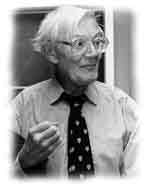William T. Tutte (Waterloo)
[ français ]
(see detailed menu on the right)
CRM-Fields Prize 2001 : William T. Tutte
 William Tutte works in graph theory and related areas of discrete math, and has done so for the last 60 years or so. This was the period of "coming of age" of graph theory; it changes from being a collection of rather easy theorems and some good open problems, to being a well-developed branch of math, stocked with rich and deep results. William Tutte works in graph theory and related areas of discrete math, and has done so for the last 60 years or so. This was the period of "coming of age" of graph theory; it changes from being a collection of rather easy theorems and some good open problems, to being a well-developed branch of math, stocked with rich and deep results.
There were only a few prime movers who brought this about; the ones that come to mind are Erdos (doing extremal combinatorics), Wagner and Halin (doing structural graph theory and infinite stuff), and Tutte. Tutte took the opportunity to do initial, ground-breaking work in several new areas that were later to grow to major fields of discrete math.
For instance, his matching theorem is the fundamental theorem of matching theory, an important branch of combinatorial optimization; in matroid theory, he proved two really deep important results (the characterizations of regular and graphic matroids), which are still pretty much the most important results of that subject; he made several other major contributions to matroid theory, including a form of what later became Edmond's matroid intersection theorem, and the discovery of the proper way to do matroid connectivity; for graphs and matroids, he came up with a polynomial which everyone else now calls the Tutte polynomial, which has most remarkable properties and connections with diverse fields (statistical mechanics, knot theory, colouring, and many others), serving to relate phenomena in these different fields; he proved many important results about connectivity in graphs (and matroids), such as his 'wheel' theorem, which is fundamental to much later work on graph connectivity; he did a great deal of work on enumeration of various kinds of pianar graphs, related to the four-colour theorem, which inspired later work on the subject.
In summary, William Tutte grabbed all the best theorems while they were still up for grabs. But more than that; his work (both written and lecture) was really beautiful - it was always a fantastic experience to watch Tutte take on some problem, apply some strange algebraic machinery to it, and make showers of consequences fall out, in the most elegant way.
Professor William Tutte was born in Newmarket, England. he studied at the University of Cambridge and obtained is Ph D. in 1948. He arrived in Canada that year and joined the University of Toronto. He is a leader the field of graph theory and matroid theory.
WILLIAM T. TUTTE (University of Waterloo)WILLIAM T. TUTTE (University of Waterloo)
TITLE: "Some adventures in Graph Theory"
PLACE: Centre de recherches mathematiques, Université de Montréal, Pavillon André-Aisenstadt, 2920, ch. de la Tour , Room 6214
DATE: Friday, November 9, 2001
TIME: 4:00 p.m.
ABSTRACT: In this lecture I tell of some episodes in my career as a graph theorist, showing how one piece of research can lead on to another. I expect to talk , among other things, of the dissection of rectangles into unequal squares, Hamiltonian circuits in planar maps, 1-factors in general graphs, chromatic polynomials and the enumeration of planar maps.
NOTE: There will be a cocktail after the lecture in Salon Maurice-l'Abbe, room 6245.
webmaster@crm.umontreal.ca
|